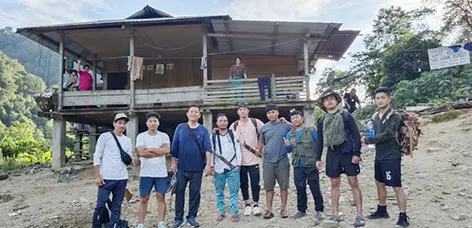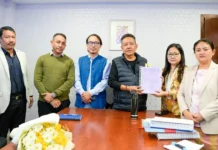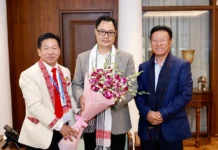[ Tasi Darang ]
Arunachal Pradesh, a land of the rising sun, is unique with around 80% of its land covered by forests and hilly terrain. Many areas in our state remain unexplored due to the rugged landscape and dense jungles. Lush greenery, pristine rivers, and streams still exist in Arunachal Pradesh. The state is predominantly tribal, with its people living closely with nature and maintaining a deep connection with their lands, rivers, and forests. Each village has its own rich history.
Situated on the banks of the Pakke River in Pakke Kessang Sub-Division, Lumta village is a particularly unique settlement. It has only one household and is not connected by a motorable road. Previously, the route to Lumta was through Suchung Village, crossing the Pakke River via a hanging bridge, scaling mountains, and traversing dense forests, giving the impression of heading towards a sanctuary. This year, a good samaritan helped the villagers create a makeshift road from NH 13, but due to the monsoon, many sections have been washed away, and landslides have blocked several points.
To reach Lumta, one must undertake a foot march, scaling mountains, crossing streams, and navigating through virgin forest. The journey takes about three hours each way and is a true test of endurance. It is more like an adventure, where one can encounter large trees, crystal-clear streams, birds, squirrels, butterflies, reptiles, and often hear the sound of barking deer. The trek includes risky sections, particularly landslide-prone areas on the mountainside.
Why does only one family remain in this village? Do they not feel isolated? Mr. Techi Tado, a final-semester BA student at the prestigious Dera Natung College and the current general secretary of the student community, explained that his father was instructed by his grandfather to remain in their birthplace and oversee the land like an eagle watching over the valley. Lumta village was once a strategic transit camp during British times, chosen for its inaccessibility to strengthen the defense system. Remnants of an old inspection bungalow still exist in Lumta. The village was on the route from Itakolla in Assam to Seijosa, Rilloh, and Seppa, but with the advent of NH 13, it was bypassed. In the 1970s, at the administration’s request, all families except one moved to Rilloh and Gumte Village under the Passa Valley Circle, Pakke Kessang district. The remaining family adopted paddy cultivation in the new locations, and the then HQ Seppa was closer. It is said that former Chief Secretary Lt. Matin Dai used to pass through Lumta when traveling from Assam to Seppa.
Many interesting incidents have occurred in the village. Mr. Tado’s mother once lost pigs to wild boars. Deer, pythons, porcupines, reptiles and jungle fowl often roam near the house. There was an instance where an old lady caught a deer barehanded, and once their dog was swallowed by a python. It is said that deep within the jungle, there is a sacred place where noise causes rain to fall. The family meets their protein needs through fish from the river.
Lumta has significant tourism potential. There are discussions about declaring it a heritage village. Jungle trekking, bird watching, butterfly observation, homestays, rural tourism, and angling could be organized to boost the family’s economy. The family has managed to adapt to nature and thrive, with their children receiving education. Network connectivity was also available at one point. Power is supplied through solar panels.
I advise those who wish to experience a primitive lifestyle in the modern world to visit Lumta. However, visitors should bring their own food and supplies to avoid burdening the family. I visited Lumta as part of community policing and to assess security needs.
I was assisted by PSO Ct Dokhum Modu, Ct Katan Gamoh, Ct Jumli Doye, local guide Solam Tana, Ngurang Neega and Tana Pali Tara. I hope to see Lumta village flourish with better road connectivity, as it holds a special place in my heart. (Darang is a member of the APPS, and currently posted as SP Pakke Kessang)




